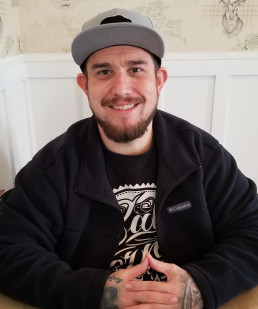
Shelter Case Manager Chris Inclan knows firsthand the power of having the right tools in your proverbial tool belt. “I come from not a great household,” he says. “My mom was an addict and my dad was an alcoholic, my dad left when I was really young, and I kinda raised myself in a way.” He got into a lot of trouble growing up, spending time in and out of jail, and struggled with addiction himself until he hit a spiritual bottom. “I was basically lost and felt empty inside,” he says, “and I got on my knees and I asked for help from whatever was out there in the universe, and it guided me to the rooms of Alcoholics Anonymous.”
After entering recovery, Chris went back to school and became a substance use disorder counselor. “I was going to go to school for business,” he says, “and I thought, what’s better than helping people with their addiction?” He worked as a substance use disorder counselor for four years before joining COTS six months ago, where his lived experience makes him uniquely qualified to lead the meditation and self-esteem group for Mary Isaak Center residents every Saturday.
He designed the group to help all COTS clients who might need it, not just those struggling with addiction. He got the idea from a self-esteem group they ran at his previous job, and decided to add in the components of meditation and mindfulness to round it out. “I remember the group being really beneficial and getting a lot of good feedback from clients in treatment. So I thought, let’s put a group together that can help with addiction issues but can also help anybody that’s just trying to better themselves.”
Every meeting starts with a check-in, a reflection period to see how everyone is doing, followed by a meditation. “Most of the time it’s a guided meditation,” says Chris, but depending on the people present, it can get a little more creative, like a chanting meditation. Then the group finishes with an exercise from a self-esteem packet, or something else Chris feels is important, like emotional intelligence.
“I’m trying to give our clients new tools, a new way to look at the world,” Chris says. “A lot of our clients have an external locus of control, and when we live from a place like that, it’s not empowering, because you don’t feel like you have any control in your life. I wanted to bring in the self-esteem component so our clients can start moving towards an internal locus of control, so they can start recognizing that they have choices. When you start choosing better decisions for your life, you’re going to feel better, you’re going to do things that will move you forward, instead of doing things that will set you back. It’s not a perfect science, but if you really give yourself to this process and make this a way of life, then I think the outcomes are totally different than if you’re just living on autopilot.”
Right now, the group is small, “but we’re trying to grow it,” says Chris. “Even if it only helps a couple of people,” it’s still worth it.
“For the person that does want help,” he adds, “being able to have the right things in place, the proper tools and assistance, [is key]. COTS does a good job of that. The culture here and the environment is really conducive to growth and getting better. This is the right place to come if you really want to change because we’re going to be able to plug you in and connect you with the right people. We’re using what we have to make a difference.”